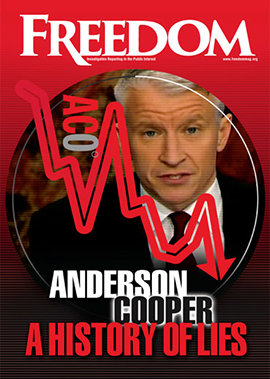They call Dr. Harold Sackeim the “Shock Doc,” with very good reason. His entire career has been shocking—in more ways than one.
Sackeim is a professor of clinical psychology at Columbia University’s Department of Psychiatry.
But more importantly, and more disturbingly, he is also one of the leading defenders and proponents of electroshock.

Oh, excuse us. Sackeim and his co-torturers in this highly profitable business prefer to call it “electroconvulsive therapy” (ECT), as if giving it a prettier, less violent name disguises the brutal nature of a “treatment” that can permanently destroy your memory and personality, damage your brain and even kill you—all in the service of “curing” your sadness.
Jan Eastgate, president of the Citizens Commission on Human Rights International (CCHR), endured ECT as a young woman. When she awoke, she could not recognize the woman sitting by her bed. It was her mother.
“ECT should never be used,” she said. “Even the World Health Organization says there are calls for it to be banned throughout the world. In two countries, it already is banned. It is a brutal, barbaric treatment.
“Sackeim is making money off of ECT, and it doesn’t matter to him that it is damaging patients.”
Sackeim also serves as a “consultant” to the machine manufacturers, and admitted he was paid at least $70,000 in “reimbursement and honoraria” fees for doing so.
Even Sackeim, who has co-authored over 300 publications promoting ECT, admits that ECT results in permanent memory loss.
Amnesia “is the most critical adverse cognitive effect of ECT,” he said. “Following ECT, many patients report persistent memory loss for events that occurred during the ECT course and the weeks and months before the course. Indeed, some patients report … gaps in memory of autobiographical events (e.g., vacations, illnesses, weddings, etc.) extending back several years.”
Sackeim also noted in 2014, “We do a gross disservice to our patients, the public, and ourselves when we deny the existence of an adverse effect that has been documented in various ways for decades and is a central concern of our patients.”
Yet, he does just that. Why?
Simple: money.
The bottom line is that, for the psychiatrists administering ECT and the companies manufacturing the equipment for it, ECT is very big business indeed. That’s why its champions insist that ECT must be protected at all costs, to keep those dollars rolling in.
Consider that SigmaStim and Somatics, two companies that manufacture ECT machines, make them for a few hundred dollars apiece—and sell them for nearly $20,000 each.
Quite a markup, no?
Sackeim also serves as a “consultant” to the machine manufacturers, and admitted he was paid at least $70,000 in “reimbursement and honoraria” fees for doing so.
The average ECT treatment cost is $2,500 apiece, with the average patient treatment program running 6 to 12 sessions.
Now consider that, every year, 100,000 Americans receive ECT. At least. Patient advocates insist there are many, many more victims, with some patients returning again and again for multiple “maintenance” treatments, often for the rest of their lives. And often with insurance or Medicare picking up the tab.
You do the math.
The conflicts of interest extend to the very top levels of the US government’s medical establishment.
The late Dr. Norman Shealy, a neurosurgeon and famed pioneer of holistic medicine, once said, “ECT should have been banned 50 years ago.” He noted that a “huge percentage” of ECT victims have brain damage.
But the public is getting wise to the dangers. ECT machine manufacturing companies have begun to wail about the impending failure of their business selling torture equipment, with the specter of bankruptcy hovering near.
ECT champions are terrified that the disappearance of these manufacturers means electroshock may become an extinct relic of the past like lobotomies, in the not-too-distant future.
Human rights activists say that it’s about time.
The Church of Scientology, along with CCHR, bitterly opposes ECT torture, and has so effectively raised awareness about its dangers—and the human rights abuse it represents—that Sackeim himself told The Daily Beast, “Scientology looks like it’s going to be successful at killing an industry.”
What would happen to poor Sackeim?
Take a closer look at the income sources of the man who champions brain damage and the scandal gets even more disturbing than it already was: the conflicts of interest extend to the very top levels of the US government’s medical establishment.

Dr. Matthew Rudorfer, Sackeim’s good pal, serves as head of the National Institute of Mental Health’s Somatic Treatments Program. Using his grant power, Rudorfer has showered Sackeim with some $9 million in “research” funds.
Their “collaboration” extends further. Rudorfer co-authored a chapter in an ECT textbook with Sackeim and serves right alongside Sackeim on the advisory board of the Journal of ECT.
The conflicts of interest are blatant—so blatant it’s “shocking.”
“How is it that a government official responsible for grants can have this kind of relationship?” Eastgate asks. “ECT is barbaric. It is not health care or mental health care—it is brain damage and torture.”
Director of the Committee for Truth in Psychiatry Linda Andre, herself a survivor of ECT, put it this way, “SHAME on Harold Sackeim for worming himself into positions of public trust, then abusing the hell out of that trust, and for making a killing doing it.”






















